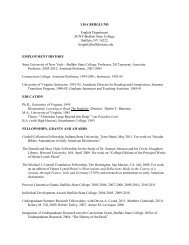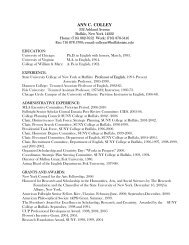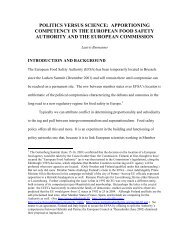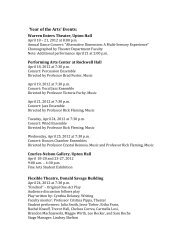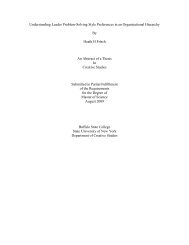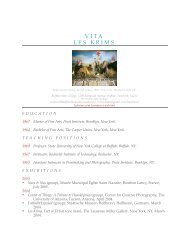Arts - Buffalo State College
Arts - Buffalo State College
Arts - Buffalo State College
Create successful ePaper yourself
Turn your PDF publications into a flip-book with our unique Google optimized e-Paper software.
W.H.”? Why did Shakespeare not consent to the publication of his<br />
poetry? Are they even in chronological order, considering the author<br />
did not watch over the publishing? I propose to rearrange the order<br />
of the sonnets, and find the most accurate chronology. I’ll perform<br />
this arrangement by following the evolution and development of<br />
Shakespeare’s metaphors, since research I’ve already conducted has<br />
established a pattern throughout Shakespeare’s poetry. He works on<br />
a metaphor for a while, then once it reaches full complexity and he’s<br />
no longer interested in it, he moves on to another, therefore grouping<br />
these sonnets together. Other authors, such as Samuel Butler, have<br />
also tried to rearrange the sonnets, and I plan to use their research<br />
in conjunction with my own to find the most coherent order. This, I<br />
hope, will further prove the fluidity of the sonnets as a piece of art,<br />
namely that there is a unity among what looks like individual pieces.<br />
Presentation Type and Session: Poster IV<br />
Preying On the Children: Effects of<br />
Consumer Culture On Our Children<br />
William Langer, COM 450: Communication and Society<br />
Faculty Mentor: Professor Michael Niman, Communication<br />
Marketing researchers increasingly define and view American<br />
children between the ages of four and twelve by their spending<br />
capacity. These researchers estimate that children directly influence<br />
over $200 billion dollars in sales, indirectly influence over $300<br />
billion dollars of purchases and personally spend over $29 billion of<br />
their own money. Because of the vast amount of spending influenced<br />
by children, marketers have developed specialized “kid centered”<br />
marketing techniques to capture children as “branded consumers”<br />
in much the same way that they target adult audiences. This<br />
project focuses on describing the effects of the consumer culture<br />
and marketing on children, both in the United <strong>State</strong>s and abroad.<br />
It examines potential negative effects including but not limited to:<br />
Impairment of normal social development and identity, the branding<br />
of children as commodities, and the rise of childhood obesity and<br />
other negative effects on health. Using content analysis of peer<br />
reviewed papers and scholarly texts,I will show that marketers<br />
purposely target children as consumers the same way they do adults<br />
to exploit them for profit. I also argue that the vast majority of<br />
commodities marketed to children can cause negative effects on their<br />
psychological development and physical health.<br />
Presentation Type and Session: Oral – Humanities I<br />
Respect and Nuclear Weapons: An<br />
Exploration In International Affairs<br />
Matthew Guminiak, PHI 401: Respect Seminar<br />
Faculty Mentor: Professor John Draeger, Philosophy<br />
In recent years, the Islamic Republic of Iran has been pursuing,<br />
in secret, the refinement of radioactive material in the face of strong<br />
international opposition. Israel and the United <strong>State</strong>s object under<br />
suspicion that beyond domestic power generation this material will<br />
Humanities<br />
be used to construct nuclear weapons. President Obama Identified<br />
this issue as a major source of tension between the Muslim and<br />
Western world during his 2008 Cairo speech and claimed weapons<br />
of such nature to be “a decisive point” beyond which mutual respect<br />
for nations applies. In this paper, I intend to use a theory on respect<br />
by Philosopher Thomas E. Hill and argue that respect does, in<br />
fact, apply to nations. From this vantage point, I intend to critique<br />
President Obama’s claim that suggests that there are limits to respect<br />
for nations and think about what those limits might be and whether<br />
nuclear weapons are an instantiation of them.<br />
Presentation Type and Session: Poster V<br />
Respect In Zombie Land<br />
Jason Offerman, PHI 401W: Respect Seminar<br />
Faculty Mentor: Professor John Draeger, Philosophy<br />
Imagine a land in which the dead walk. There is no law and<br />
the main goal is survival. We might call this place “Zombie Land.”<br />
In this lawless land it must be wondered whether respect for the<br />
moral law exists at all. Respect for persons typically stems from<br />
the acknowledgement of the special status of human beings, but<br />
zombies are not human beings. Respect for persons also promotes<br />
the greatest good of the many, but it is unclear how this would<br />
apply to zombies. Now imagine having to let zombies consume a<br />
fellow human in order to get vital medicine back to large group<br />
of human survivors. More people will benefit in the long run, but<br />
it comes at the expense of leaving an innocent human to be eaten.<br />
This presentation considers whether innocent human lives can be<br />
sacrificed for the greater good or whether valuing each life prohibits<br />
such actions.<br />
Presentation Type and Session: Oral – Humanities II<br />
The Rights of Women and the Rights of the<br />
Unborn<br />
Nickolas Beauharnois, PHI 401W: Respect Seminar<br />
Faculty Mentor: Professor John Draeger, Philosophy<br />
The debate on abortion brings about equal amounts of<br />
passionate emotion from both sides. The problem is typically<br />
characterized as a conflict between the rights of the unborn who<br />
cannot presently speak for themselves, but have the potential to<br />
do so in the future, and the rights of the matured women carrying<br />
them. This paper explores whether rights should be seen as moral<br />
principles or claims about well-being. According to the principle<br />
conception, rights are due to women because of the fact of their<br />
personhood and due to the unborn because of their potential of<br />
gaining personhood. According to the well-being conception, rights<br />
are due to women and the unborn because it is in the interest of the<br />
greater good. I will argue for the former, and specifically that the<br />
rights of women trump those of the unborn.<br />
Presentation Type and Session: Oral – Humanities II<br />
89




